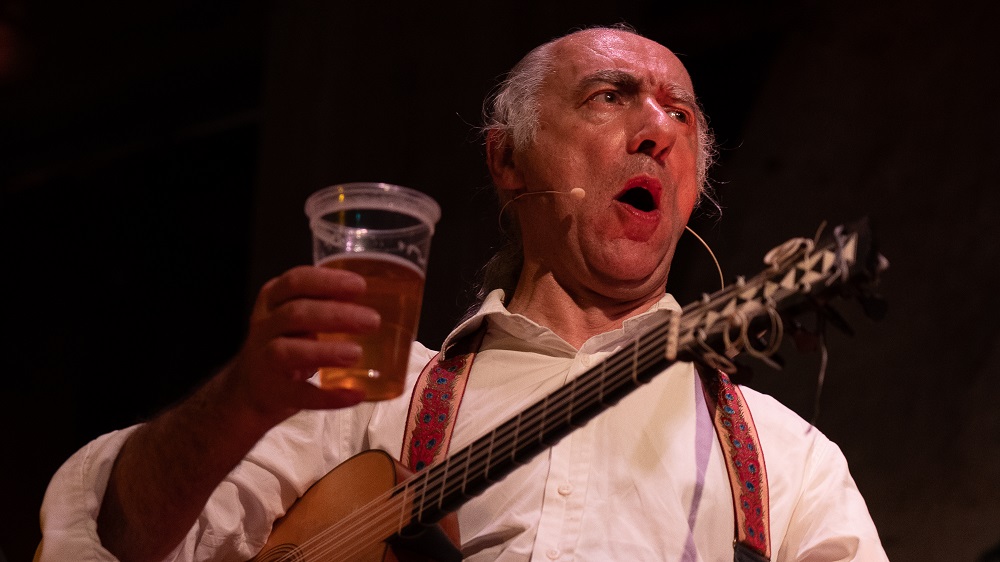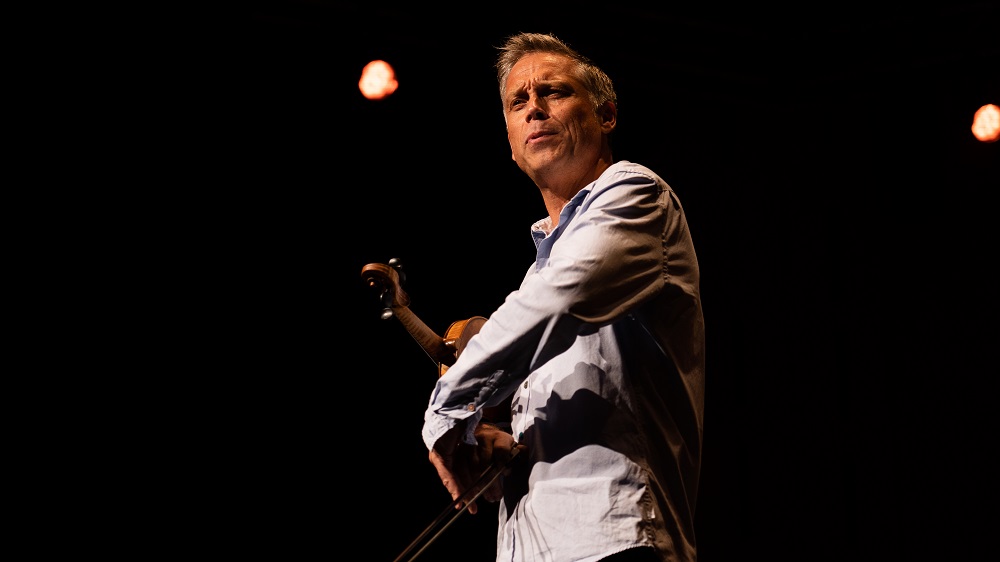Purcell's Playhouse, Bevan, Barokksolistene, Eike, Purcell Room review - kaleidoscopic delights | reviews, news & interviews
Purcell's Playhouse, Bevan, Barokksolistene, Eike, Purcell Room review - kaleidoscopic delights
Purcell's Playhouse, Bevan, Barokksolistene, Eike, Purcell Room review - kaleidoscopic delights
Vivacious British soprano shares the communicative spirit of her Norwegian colleagues

“What about the communication with the audience?” asked violinist and impresario Bjarte Eike in his First Person piece for theartsdesk. “How can a 'normal' concert be turned into a special event?” Explaining how is one thing – but doing it to dazzle our senses is what counts. Though the Alehouse Session which followed out in the foyer was brilliant business more or less as usual, “Purcell’s Playhouse” took us further on the road of making the old absolutely new.
The cue for our entertainment surely came from great Henry himself, purveyor of theatre music for curious hybrids as well as odes and instrumental masterpieces, but only one work we’d strictly call an opera. Dido and Aeneas. To the Overture from The Old Batchelor, our players strutted on and promenaded – even cellist Judith-Maria Blomsterberg, whose instrument never touched the ground. Hail, too, or welcome back, to consummate jack-of-all-trades Steven Player (pictured below at the later Alehouse Session), whose superb movements incorporate flamenco and Irish dancing (but the arms fly while body and head are kept still).  For some reason the South Bank hadn’t supplied the proffered programme details, which simply meant that Eike had to work harder – which with him always seems charming and effortless – on telling us what we’d heard or were going to hear (pictured below). Spotlight next on the very special guest, Mary Bevan. It was already good to see Blomsterberg and Naomi Burell among the players; the Alehouse sessions proper tend to be very blokey affairs. And now we had a performer fully in tune with the communicative spirit of the team.
For some reason the South Bank hadn’t supplied the proffered programme details, which simply meant that Eike had to work harder – which with him always seems charming and effortless – on telling us what we’d heard or were going to hear (pictured below). Spotlight next on the very special guest, Mary Bevan. It was already good to see Blomsterberg and Naomi Burell among the players; the Alehouse sessions proper tend to be very blokey affairs. And now we had a performer fully in tune with the communicative spirit of the team.
The big solo scena, Bevan in partnership with harpsichordist Hans Knut Sveen, was the very dramatic, freewheeling character-study “Mad Bess”, complete with scene-setting where the soprano quickly won her laurels ad-libbing to a clatter from below stage right. Then she integrated perfectly with the big sequence at the heart of the programme – no less than 10 Purcell pieces of all shapes, and speeds, the element of improvisation and Helge Andreas Norbakken’s percussion fitting perfectly into the context. As there were a fair number of chaconnes, where a line constantly repeats with various ideas above it, it was absolutely natural for double-bass Johannes Lundberg to inject what felt like a laid-back jazz vibe.  Just once, with the pack rounding as malign fairies and hobgoblins on the soprano, the theatricality verged on the overdone, but mostly it was a delight. For the Fantasia a4, Eike and viola-player Per Buhre (adaptable as counter-tenor) came from the back of the hall to join their two colleagues on stage – a magical effect. Likewise Bevan’s exquisite poise in An Evening Hymn, ending in a sleep stalked by another singer and Alehouse regular, Thomas Guthrie, in “Hush no more” from The Fairy Queen. Magical chorus – these instrumentalists do vocals to perfection, too – then exeunt omnes, fingers to lips.
Just once, with the pack rounding as malign fairies and hobgoblins on the soprano, the theatricality verged on the overdone, but mostly it was a delight. For the Fantasia a4, Eike and viola-player Per Buhre (adaptable as counter-tenor) came from the back of the hall to join their two colleagues on stage – a magical effect. Likewise Bevan’s exquisite poise in An Evening Hymn, ending in a sleep stalked by another singer and Alehouse regular, Thomas Guthrie, in “Hush no more” from The Fairy Queen. Magical chorus – these instrumentalists do vocals to perfection, too – then exeunt omnes, fingers to lips.
There had to be a rollicking encore, though, and Eike told us they’d knocked this one together the night before. The Sailors and Witches in Dido are usually something of an irritant, so why not go way over the top for laughs? They did, and the audience loved it. Then to the Alehouse in the foyer, and familiar, always welcome business from the blokes. The one thing I don’t go happily along with is Guthrie’s slightly uneasy style – the talent doesn't seem to me quite equal to the rest – so when he started up his sea shanty shtick past 11pm, it was time to make a discreet exit. This is probably the only time when I’d say that the Alehouse felt like an optional extra, Purcell’s Playhouse having served up such a perfect banquet. But for those experiencing the unique formula for the first time, it would have been just as welcome.
rating
Explore topics
Share this article
The future of Arts Journalism
You can stop theartsdesk.com closing!
We urgently need financing to survive. Our fundraising drive has thus far raised £49,000 but we need to reach £100,000 or we will be forced to close. Please contribute here: https://gofund.me/c3f6033d
And if you can forward this information to anyone who might assist, we’d be grateful.

Subscribe to theartsdesk.com
Thank you for continuing to read our work on theartsdesk.com. For unlimited access to every article in its entirety, including our archive of more than 15,000 pieces, we're asking for £5 per month or £40 per year. We feel it's a very good deal, and hope you do too.
To take a subscription now simply click here.
And if you're looking for that extra gift for a friend or family member, why not treat them to a theartsdesk.com gift subscription?
more Classical music
 Robin Holloway: Music's Odyssey review - lessons in composition
Broad and idiosyncratic survey of classical music is insightful but slightly indigestible
Robin Holloway: Music's Odyssey review - lessons in composition
Broad and idiosyncratic survey of classical music is insightful but slightly indigestible
 Classical CDs: Wolf-pelts, clowns and social realism
British ballet scores, 19th century cello works and contemporary piano etudes
Classical CDs: Wolf-pelts, clowns and social realism
British ballet scores, 19th century cello works and contemporary piano etudes
 Bizet in 150th anniversary year: rich and rare French offerings from Palazzetto Bru Zane
Specialists in French romantic music unveil a treasure trove both live and on disc
Bizet in 150th anniversary year: rich and rare French offerings from Palazzetto Bru Zane
Specialists in French romantic music unveil a treasure trove both live and on disc
 Scottish Chamber Orchestra, Ibragimova, Queen’s Hall, Edinburgh review - rarities, novelties and drumrolls
A pity the SCO didn't pick a better showcase for a shining guest artist
Scottish Chamber Orchestra, Ibragimova, Queen’s Hall, Edinburgh review - rarities, novelties and drumrolls
A pity the SCO didn't pick a better showcase for a shining guest artist
 Kilsby, Parkes, Sinfonia of London, Wilson, Barbican review - string things zing and sing in expert hands
British masterpieces for strings plus other-worldly tenor and horn - and a muscular rarity
Kilsby, Parkes, Sinfonia of London, Wilson, Barbican review - string things zing and sing in expert hands
British masterpieces for strings plus other-worldly tenor and horn - and a muscular rarity
 From Historical to Hip-Hop, Classically Black Music Festival, Kings Place review - a cluster of impressive stars for the future
From quasi-Mozartian elegance to the gritty humour of a kitchen inspection
From Historical to Hip-Hop, Classically Black Music Festival, Kings Place review - a cluster of impressive stars for the future
From quasi-Mozartian elegance to the gritty humour of a kitchen inspection
 Shibe, LSO, Adès, Barbican review - gaudy and glorious new music alongside serene Sibelius
Adès’s passion makes persuasive case for the music he loves, both new and old
Shibe, LSO, Adès, Barbican review - gaudy and glorious new music alongside serene Sibelius
Adès’s passion makes persuasive case for the music he loves, both new and old
 Anja Mittermüller, Richard Fu, Wigmore Hall review - a glorious hall debut
The Austrian mezzo shines - at the age of 22
Anja Mittermüller, Richard Fu, Wigmore Hall review - a glorious hall debut
The Austrian mezzo shines - at the age of 22
 First Person: clarinettist Oliver Pashley on the new horizons of The Hermes Experiment's latest album
Compositions by members of this unusual quartet feature for the first time
First Person: clarinettist Oliver Pashley on the new horizons of The Hermes Experiment's latest album
Compositions by members of this unusual quartet feature for the first time
 Gesualdo Passione, Les Arts Florissants, Amala Dior Company, Barbican review - inspired collaboration excavates the music's humanity
At times it was like watching an anarchic religious procession
Gesualdo Passione, Les Arts Florissants, Amala Dior Company, Barbican review - inspired collaboration excavates the music's humanity
At times it was like watching an anarchic religious procession
 Classical CDs: Camels, concrete and cabaret
An influential American composer's 90th birthday box, plus British piano concertos and a father-and-son duo
Classical CDs: Camels, concrete and cabaret
An influential American composer's 90th birthday box, plus British piano concertos and a father-and-son duo
 Cockerham, Manchester Camerata, Sheen, Martin Harris Centre, Manchester review - re-enacting the dawn of modernism
Two UK premieres added to three miniatures from a seminal event of January 1914
Cockerham, Manchester Camerata, Sheen, Martin Harris Centre, Manchester review - re-enacting the dawn of modernism
Two UK premieres added to three miniatures from a seminal event of January 1914

Add comment